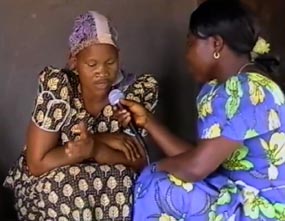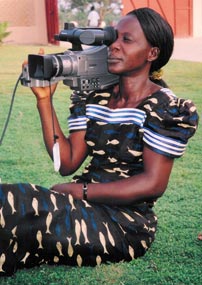“Through Our Eyes” in Guinea and Liberia
In early 2006, a two-week workshop at Lainé refugee camp in Guinea’s Forest Region brought together ARC field staff, refugee women, and other community members. Training was carried out by C4C with technical assistance from CPTAFE, our local partner organization (see Guinea, Projet Video Sabou et Nafa). Participants gained practical skills in community video production and interpersonal communication, and shared essential information on gender-based violence, its root causes, and related health issues.
 Over the
first days of training, participants became familiar with the camera gear and viewed examples of video
work that promotes health, human rights, and gender justice goals. Through group activities and
discussion, they identified prevalent forms and causes of gender violence in their communities. As the
workshop progressed, participants built their skills in storyboarding, production planning and
sequential filming, essential for the "in-camera" editing approach adopted for the project. By
the second week, participants were carrying out interviews with community members and preparing their
first productions. Filmed during the final days of the workshop, these initial programs included a
documentary on early/forced marriage and short dramas on rape and community responses to domestic abuse.
Subsequent project workshops have continued to follow this integrated two-week training format.
Over the
first days of training, participants became familiar with the camera gear and viewed examples of video
work that promotes health, human rights, and gender justice goals. Through group activities and
discussion, they identified prevalent forms and causes of gender violence in their communities. As the
workshop progressed, participants built their skills in storyboarding, production planning and
sequential filming, essential for the "in-camera" editing approach adopted for the project. By
the second week, participants were carrying out interviews with community members and preparing their
first productions. Filmed during the final days of the workshop, these initial programs included a
documentary on early/forced marriage and short dramas on rape and community responses to domestic abuse.
Subsequent project workshops have continued to follow this integrated two-week training format.
Following the workshop, participants formed the first “Through Our Eyes” video teams: one based in
N’Zerekore, Guinea, and the other in Bong County, Liberia. Based on their deep familiarity with the
issues facing their communities, the teams began to produce video dramas and documentaries on such
subjects as rape, forced marriage, and the links between alcohol abuse and spousal violence. Shared with
local audiences through community “playbacks” (screening/ discussion sessions), the videos help spark
dialogue around topics rarely discussed in public settings. Viewers share their experiences and offer
their ideas on how to address violence in the community. They also gain information about ARC’s services
for survivors of violence, including legal aid, counseling, and skills training programs that foster
women’s economic independence.
The arrival of peace in Liberia triggered a mass return of refugees from Guinea. Gender-based violence,
however, has continued to pose a critical threat to women and girls in the post-war period. The scope of
project activities has grown and evolved in response to need. Many early productions provided specific
information on care for survivors of rape, prosecution of perpetrators, and treatment of
sexually-transmitted infections. More recent productions have focused on themes of women’s rights,
girls’ education, and shared decision-making between spouses.
 Community
video playback sessions have prompted many individuals to seek ARC’s services. In Liberia—where an
estimated 40% of all women are survivors of conflict-related sexual violence—field staff noted increased
numbers of adult women coming forward to report assaults and seek counseling following the start of the
video project. This suggests that the video scenarios resonate with viewers in such a way as to lessen
their concerns about social stigma and encourage them to seek appropriate care.
Community
video playback sessions have prompted many individuals to seek ARC’s services. In Liberia—where an
estimated 40% of all women are survivors of conflict-related sexual violence—field staff noted increased
numbers of adult women coming forward to report assaults and seek counseling following the start of the
video project. This suggests that the video scenarios resonate with viewers in such a way as to lessen
their concerns about social stigma and encourage them to seek appropriate care.
The self-representational nature of participatory video enables survivors of gender violence to play an active role in promoting change within their communities. Some survivors choose to speak out directly. The refugee woman featured in the team’s first tape, a documentary on the consequences of forced/early marriage, wanted to share her story on camera and urge parents to abandon the practice that had such harmful effects on her own life.
Many survivors of gender violence take part in project activities in other ways—by assisting on a production, for example, or by helping develop a drama that reflects their experiences in a fictional form. For many survivors, speaking out against gender violence is a deeply empowering act, and a step in the gradual process of healing.
In addition to community-specific videotapes, the “Through Our Eyes” team in Liberia has produced programs in collaboration with government agencies and partner organizations on such topics as HIV/AIDS awareness, peace-making, and the prevention of sexual exploitation and abuse. To date, the team has produced more than 35 programs in various local languages.
[The video playback discussion] empowers our sisters, our mothers, to speak for themselves, to express their feeling about the level of violence against them, and the way out…the video can mobilize the community for itself.
The greatest satisfaction has been the fact that many people with GBV [gender-based violence] problems have been able to come out with their own problems and sought help with ARC as a result of seeing the video.
- Video team members, Liberia
© Communication for Change, Inc. 2003-2019. All rights reserved.
